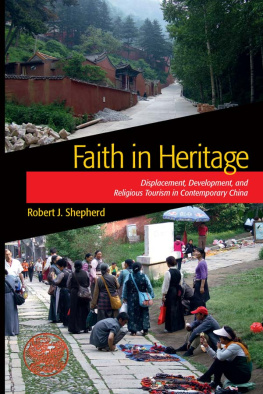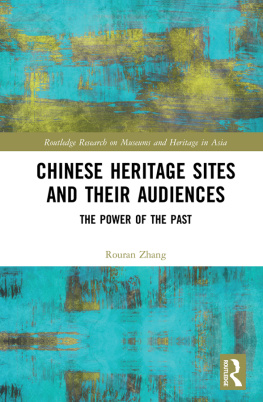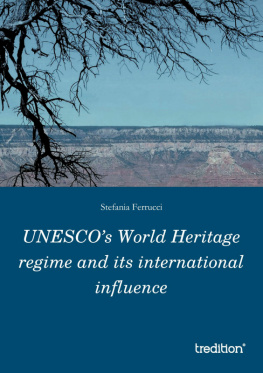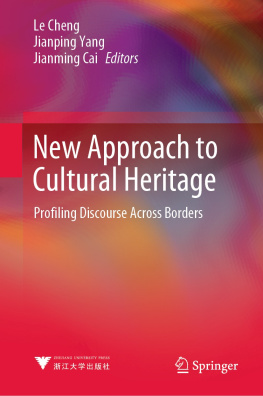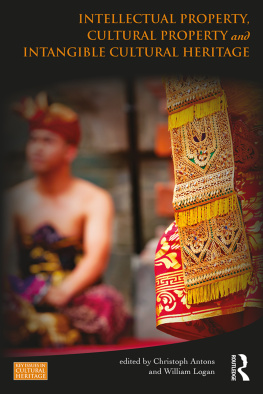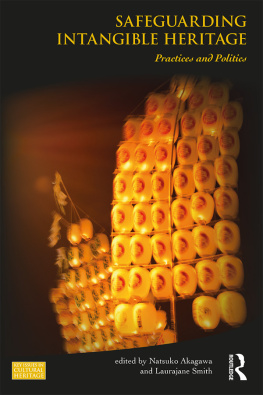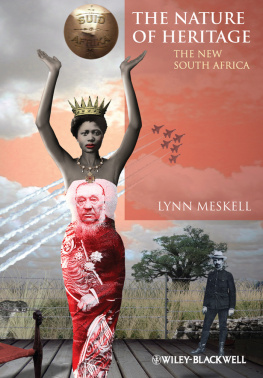WORLD HERITAGE ON THE GROUND
EASA Series
Published in Association with the European Association of Social Anthropologists (EASA)
Series Editor: Eeva Berglund, University of Helsinki
Social anthropology in Europe is growing, and the variety of work being done is expanding. This series is intended to present the best of the work produced by members of the EASA, both in monographs and in edited collections. The studies in this series describe societies, processes, and institutions around the world and are intended for both scholarly and student readership.
1. LEARNING FIELDS
Educational Histories of European Social Anthropology
Edited by Dorle Drackl, Iain R. Edgar and Thomas K. Schippers
2. LEARNING FIELDS
Current Policies and Practices in European Social Anthropology Education
Edited by Dorle Drackl and Iain R. Edgar
3. GRAMMARS OF IDENTITY/ALTERITY
A Structural Approach
Edited by Gerd Baumann and Andre Gingrich
4. MULTIPLE MEDICAL REALITIES
Patients and Healers in Biomedical, Alternative and Traditional Medicine
Edited by Helle Johannessen and Imre Lzr
5. FRACTURING RESEMBLANCES
Identity and Mimetic Conflict in Melanesia and the West
Simon Harrison
6. SKILLED VISIONS
Between Apprenticeship and Standards
Edited by Cristina Grasseni
7. GOING FIRST CLASS?
New Approaches to Privileged Travel and Movement
Edited by Vered Amit
8. EXPLORING REGIMES OF DISCIPLINE
The Dynamics of Restraint
Edited by Noel Dyck
9. KNOWING HOW TO KNOW
Fieldwork and the Ethnographic Present
Edited by Narmala Halstead, Eric Hirsch and Judith Okely
10. POSTSOCIALIST EUROPE
Anthropological Perspectives from Home
Edited by Lszl Krti and Peter Skalnk
11. ETHNOGRAPHIC PRACTICE IN THE PRESENT
Edited by Marit Melhuus, Jon P. Mitchell and Helena Wulff
12. CULTURE WARS
Context, Models and Anthropologists Accounts
Edited by Deborah James, Evelyn Plaice and Christina Toren
13. POWER AND MAGIC IN ITALY
Thomas Hauschild
14. POLICY WORLDS
Anthropology and Analysis of Contemporary Power
Edited by Cris Shore, Susan Wright and Davide Per
15. HEADLINES OF NATION, SUBTEXTS OF CLASS
Working Class Populism and the Return of the Repressed in Neoliberal Europe
Edited by Don Kalb and Gabor Halmai
16. ENCOUNTERS OF BODY AND SOUL IN CONTEMPORARY RELIGIOUS PRACTICES
Anthropological Reflections
Edited by Anna Fedele and Ruy Llera Blanes
17. CARING FOR THE HOLY LAND
Filipina Domestic Workers in Israel
Claudia Liebelt
18. ORDINARY LIVES AND GRAND SCHEMES
An Anthropology of Everyday Religion
Edited by Samuli Schielke and Liza Debevec
19. LANDSCAPES BEYOND LAND
Routes, Aesthetics, Narratives
Edited by Arnar rnason, Nicolas Ellison, Jo Vergunst and Andrew Whitehouse
20. CYBERIDENTITIES AT WAR
The Moluccan Conflict on the Internet
Birgit Bruchler
21. FAMILY UPHEAVAL
Generation, Mobility and Relatedness Among Pakistani Migrants in Denmark
Mikkel Rytter
22. PERIPHERAL VISION
Politics, Technology, and Surveillance
Catarina Frois
23. BEING HUMAN, BEING MIGRANT
Senses of Self and Well-Being
Edited by Anne Sigfrid Grnseth
24. BEING A STATE AND STATES OF BEING IN HIGHLAND GEORGIA
Florian Mhlfried
25. FLEXIBLE CAPITALISM
Exchange and Ambiguity at Work
Edited by Jens Kjaerulff
26. CONTEMPORARY PAGAN AND NATIVE FAITH MOVEMENTS IN EUROPE
Colonialist and Nationalist Impulses
Edited by Kathryn Rountree
27. FIGURATION WORK
Student Participation, Democracy and University Reform in a Global Knowledge Economy
Gritt B. Nielsen
28. WORLD HERITAGE ON THE GROUND
Ethnographic Perspectives
Edited by Christoph Brumann and David Berliner
WORLD HERITAGE ON THE GROUND
Ethnographic Perspectives
Edited by
Christoph Brumann and David Berliner

Published in 2016 by
Berghahn Books
www.berghahnbooks.com
2016 Christoph Brumann and David Berliner
All rights reserved. Except for the quotation of short passages for the purposes of criticism and review, no part of this book may be reproduced in any form or by any means, electronic or mechanical, including photocopying, recording, or any information storage and retrieval system now known or to be invented, without written permission of the publisher.
Library of Congress Cataloging-in-Publication Data
Names: Brumann, Christoph, editor. | Berliner, David, editor.
Title: World heritage on the ground : ethnographic perspectives / edited by Christoph Brumann and David Berliner.
Description: New York : Berghahn Books, 2016. | Series: EASA series ; v. 28 | Includes bibliographical references and index.
Identifiers: LCCN 2015041486 (print) | LCCN 2016001155 (ebook) | ISBN 9781785330919 (hardback : alk. paper) | ISBN 9781785330926 (ebook)
Subjects: LCSH: World Heritage areasSocial aspects. | Ethnology.
Classification: LCC G140.5 .W667 2016 (print) | LCC G140.5 (ebook) | DDC 363.6/9dc23
LC record available at http://lccn.loc.gov/2015041486
British Library Cataloguing in Publication Data
A catalogue record for this book is available from the British Library
ISBN: 978-1-78533-091-9 (hardback)
ISBN: 978-1-78533-092-6 (ebook)
Contents
Figures
Introduction
UNESCO World Heritage Grounded?
Christoph Brumann and David Berliner
In its 2014 session in Doha, Qatar, the World Heritage Committee inscribed the one thousandth site on the World Heritage List. This was heralded as a mixed blessing, signalling the unanticipated success of an international treaty with close to universal ratification (191 states) that has created a highly coveted global distinction for cultural and natural wonders but also the administrative challenge and risk of inflation that a potentially endless listing exercise poses. In what, aside from being a global clearinghouse for heritage valuation and conservation standards, has become a breathless bureaucratic machinery, there is often little time for asking fundamental questions. But if the opportunity arises, one issue is certain to draw attention: What does World Heritage actually do on the ground of the World Heritage properties, far away from the meeting halls where the Committee takes its decisions? Does World Heritage deliver on its promise of conservation and global curatorial responsibility or does it do other things, and through and to whom exactly? Does World Heritage bring local situations under the standardizing influence of global forces, or do these remain marginal to the social processes at and around World Heritage sites? And what happens when the reverence for heritage collides with other value orientations and livelihood needs?
This collection presents a set of nuanced answers to these questions, based on the in-depth ethnographic exploration of selected sites on the World Heritage List. Impact studies of World Heritage properties, often with an applied interest, are by no means rare, and the World Heritage organizations themselves have compiled a collection for the fortieth anniversary of the convention (Galla 2012). In this volume, however, all contributors are anthropologists that is, specialists in the painstaking acquisition of local knowledge who have conducted long-term ethnographic fieldwork at the sites they discuss, supported by the required linguistic skills. Moreover, all have made understanding the local social situation their main priority, not merely a side pursuit subservient to a conservation agenda. What we therefore aim to deliver is a more comprehensive, fine-grained and less partisan understanding of what World Heritage does on the ground.
Next page

